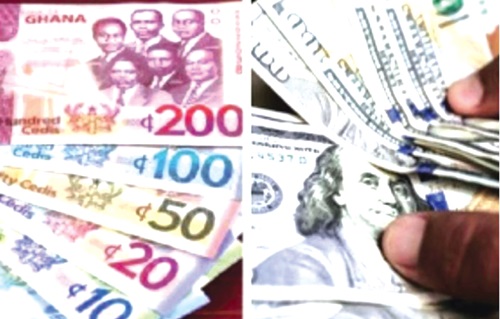I must readily issue a disclaimer before I proceed further, just in case you, dear reader, assume that in discussing foreign exchange issues this week, I am armed with some advanced (or even basic) degrees in banking and finance from top global institutions with which to mesmerise you.
I am not; I assure you.
Indeed, in secondary school, I pointedly avoided Economics and preferred Government, because the figures and complex charts I saw in Economics textbooks frightened me, given my deep-seated phobia of anything mathematical, all the way from primary school.
Dollar conspiracy
One factor that can send literally the entire nation into spasms of concern and downright panic, besides the price of fuel, is the exchange rate, particularly of the cedi to the US dollar.
When these two conspire, they can send the economy into a tailspin as they can ‒ and do ‒ decide the price of literally everything, primarily because of our huge import dependency.
Exchange rates do scare politicians, too.
When the price of goods jumps through the roof due to a depreciation of the cedi, it creates hardships and makes the government vulnerable, especially when an election is around the corner.
The 2016 and the 2024 elections rode largely on the high cost of living, which was made possible on the back of a dancing cedi, which, of course, the opposition in each of these elections raised hell over, with a change of government ensuing in each case.
Of course, it would be churlish to reduce the election outcomes to the exchange rate, but given the huge adverse impact this had on our economy, it cannot be dismissed.
Political jubilation
In recent times, the Cedi appears to be doing quite well against the dollar, flexing its muscle and getting praise from market watchers, traders and the general public.
My National Democratic Congress (NDC) friends are over the moon over what they call the ‘Mahama Magic’, reminding me poetically at every turn that the finance minister, Ato Forson, is ‘forcing paa.’
I can imagine the relief and glow the managers of the economy must be feeling.
As a country, we tend to blame the president for everything that goes wrong.
According to anecdotal evidence, General I.K. Acheampong, Head of State from 1972 to 1978, was blamed for the poor rains back in the 1970s, to which he is said to have retorted, “Am I God, to cause rain to fall?”
Even our World Cup performance is cited as a function of the good or bad luck of the president of the day.
That is how simplistic many of us can be. I, therefore, have no qualms about President Mahama enjoying a lap of glory for the current strong standing of the Cedi. It is only fair.
But as I said to an NDC friend the other day, whilst we pray for the continued strong performance of the cedi, he should absorb the criticisms quietly on behalf of the President and not blame other factors should things go south, especially since we do not control all the factors that determine the performance of our currency.
Perhaps, what Ghanaian politicians never learn from our political history is that it is risky to do politics with the exchange rate or fuel prices when in opposition, because most of the time, they come back to bite funnily.
But then, I suppose when seeking power, the temptation to throw out everything is simply irresistible.
It is, perhaps, important to remember that the same sun that melts wax, hardens clay, and that not everyone is rejoicing at this turn of events.
This has nothing to do with one’s party colours.
When I asked a couple of my finance friends to break things down gently as they would to a primary six-year-old child, they kindly explained that importers are happy because they need fewer cedis to import the same item whose dollar price has not changed.
Equally, those who pay dollar-indexed school fees, airline fares or property prices in cedis will feel a huge sense of relief because they now have to cough up fewer cedis to make payment for the same dollar value.
However, they said exporters are less than exhilarated, because the size of their fortunes is dependent on how strong the dollar is to the cedi, as their goods are mostly exported and sold in dollars.
This means that the weaker the exchange rate, the more cedis they get for every unit of sale, and therefore, the more their margin (profit) because after all their costs remain largely constant in cedis, ceteris paribus (all things being equal)!!
Then, of course, there are those who regularly receive monthly remittances from friends or relatives abroad, or send money home for various projects to be undertaken on their behalf.
Given that the prices of goods and services have refused to fall in tandem with the falling dollar, this means they lose purchasing power with the lower cedi equivalent of the same foreign exchange sent down, and I cannot imagine they would be amused.
Those who have dollars sitting peacefully in their wardrobes, portmanteaus or under their beds may also be getting quite nervous, wondering when the decline will bottom out or whether they should sell them before it declines further and loses value.
Hope, prayer
A stable, strong Cedi is good for our economy and we must all hope the run continues.
Whether you operate a foreign account brimming with dollars or you have never seen or touched a dollar note in your life, the dollar-cedi romance touches you one way or the other.
Far from an energetic, wild tango dance, may the two currencies enjoy a warm, cosy dance to smooth, soothing music. Amen.
Rodney Nkrumah-Boateng.
E-mail: rodboat@yahoo.com

